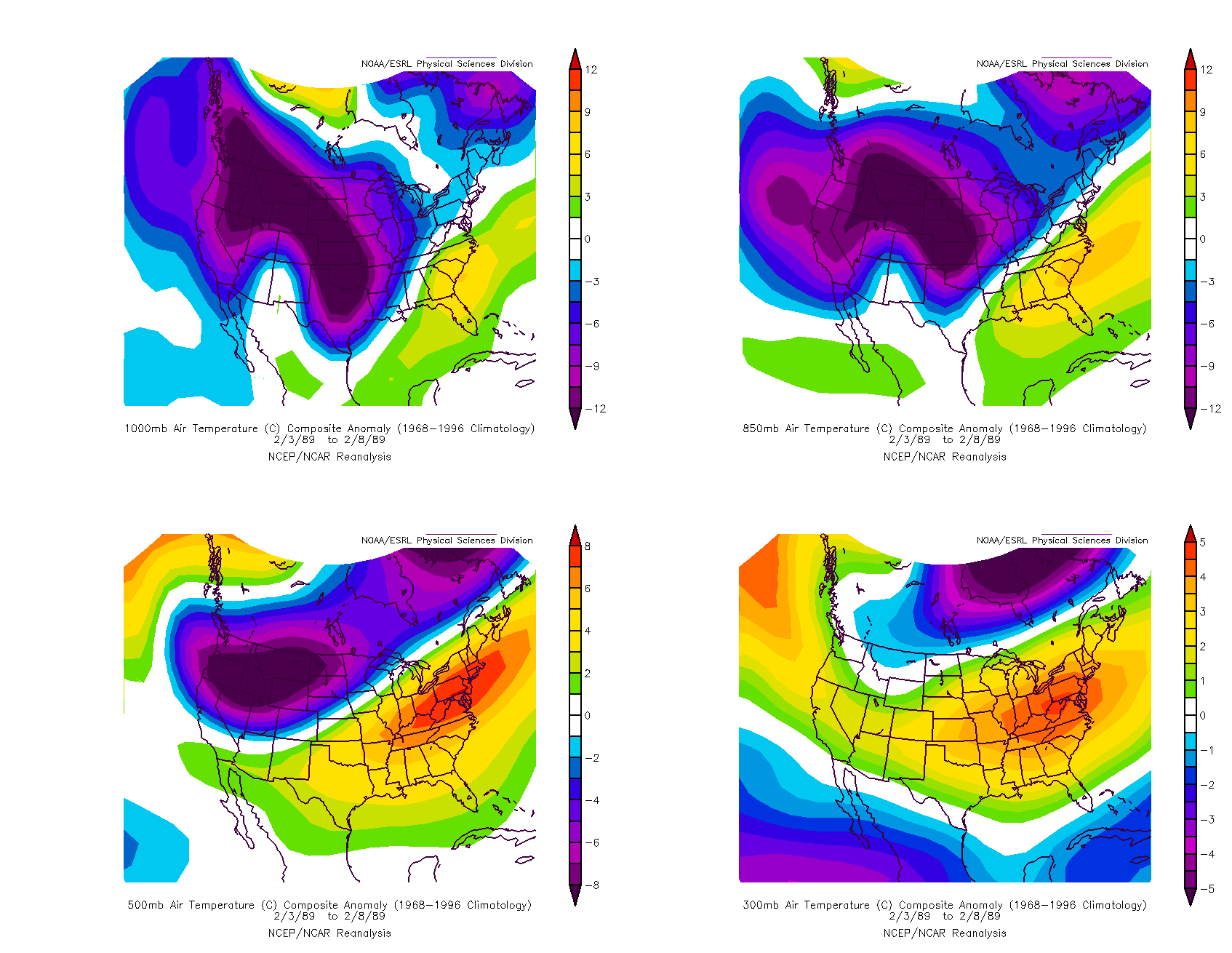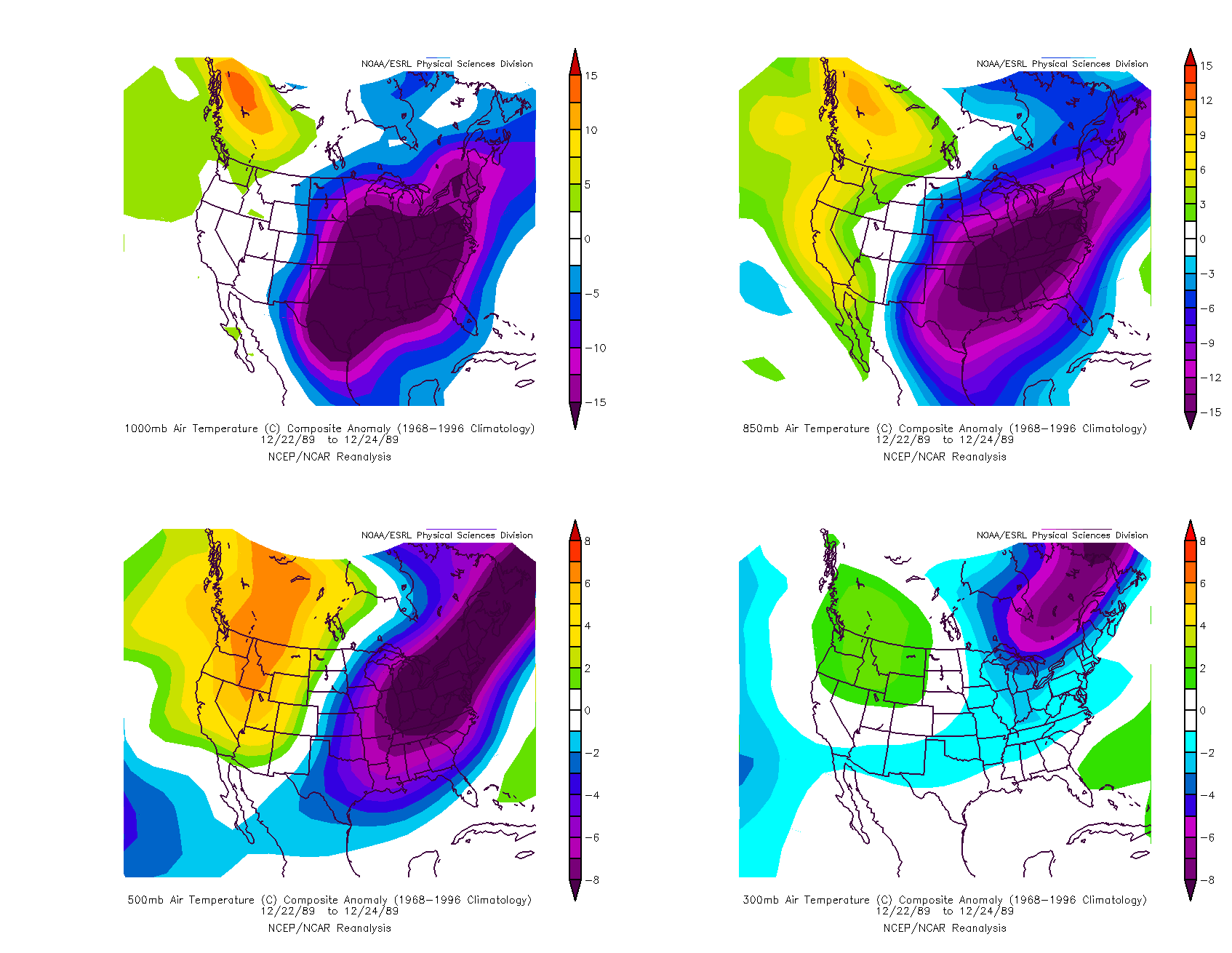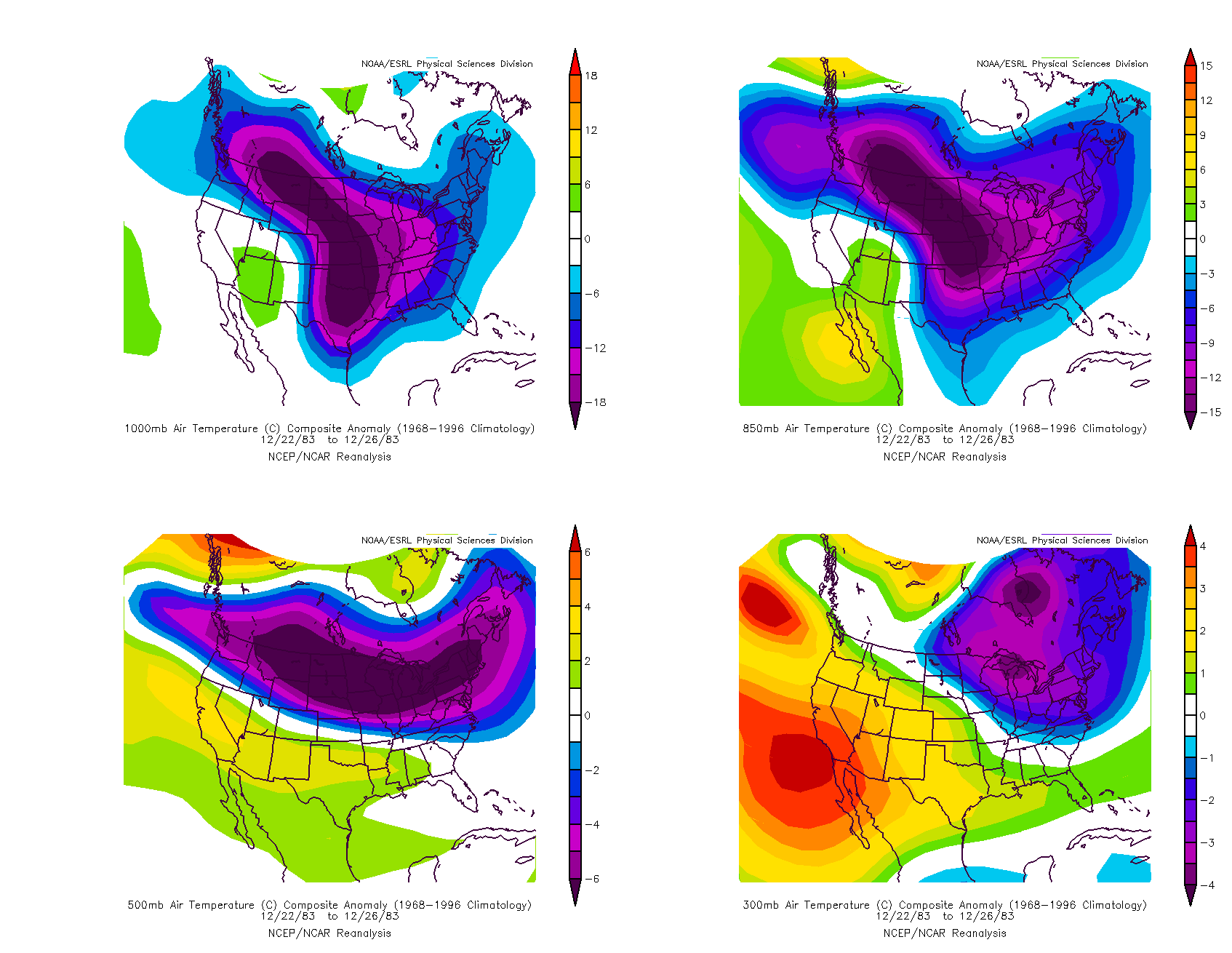No, in February 1989, Houston was below freezing for a few consecutive days. February 4-6th.
Blizzards in Southeast Texas. Here's an interesting read:
EARLY WEATHER IN SOUTHEAST TEXAS:
ICE SKATERS ONCE GLIDED ON SABINE LAKE
By W. T. Block
Copyrighted and reprinted from Beaumont ENTERPRISE-JOURNAL, January 21, 1979, p. 9-A.
Have you ever wished for a little snow in Beaumont, Orange, or Lake Charles? If so, don't wish for too much - please! - because nature has been known on two occasions in the past to be overly generous with the white, fluffy stuff, and who knows, nature might choose once more to repeat its past record snowfalls.
Or maybe you've heard Grandpa talk about the snows that once covered the fence posts along the Gulf coast during his boyhood days, and perhaps you suspected the old codger of stretching the truth somewhat. You can rest assured -- he wasn't!
Whether one checks the snowfalls of recent decades or those of the 1890s, the record reveals that most of them have occurred in the month of February. Hence the odds are good that if Jefferson County is to be blanketed deep in the white fluffy stuff once again, it has a better than average chance to occur during the same month.
On February 14-15, 1895, Southeast Texas and Southwest Louisiana were paralyzed when 31 inches of snow fell in twenty-four hours. It was every man, or woman, or child for himself or herself as schools, stores, churches and sawmills closed down until it warmed up, and every pot-bellied stove glowed a cherry red as each person sought to ward off the bitter cold. (Firewood was no problem in either community around 1900 for every sawmill had large quantities of waste-wood products for free).
Perhaps Beaumont established a state record of sorts as of that year, or so the editor of Galveston "Daily News" inferred in his "Beaumont Budget" of Feb. 17, which read:
"Beaumont has made a record for herself that has perhaps not been equaled before in any other city in the state. Beside the disagreeable distinction of claiming the heaviest snowfall, she also thinks she can claim the distinction of having had used on her streets the first snowshoes ever made in Texas."
"Last night (Feb. 15) Messrs. Al Doucette (for whom the East Texas city is named) and W. G. Hinman walked down Pearl Street wearing snowshoes that fully sustained their weight and fulfilled their functions in every respect. They had a crowd at their heels watching the sight."
At Orange, D. R. Wingate, a prominent sawmiller and old pioneer who had lived in Texas since 1852, observed that the "past six days have had more arctic weather in them than I have experienced in any week in forty years." The editor observed that:
"The locomotive that does the switching in the yards here could not plow its way through the snow that averaged twenty-four inches on top of the rails...In some places, snow drifted to a depth of six feet and effectively blocked traffic at every mill along the river."
Realizing that the top of the rails would stand from at least eight to ten inches above ground level, the snow's depth certainly summed up to some figure between 30 and 36 inches. {From DAILY NEWS, Feb. 16, 17, 1895}
The extremities of weather in the year 1895 were really not that different from weather conditions of Civil War days. Two tombstones in Sabine Pass Cemetery are for 18-year-old boys, who froze to death only 100 yards from their homes during a blinding blizzard. In January, 1864, Sergeant H. N. Connor of Spaight's Battalion reported 21 consecutive days of sub-freezing temperatures in Southeast Texas. One soldier of his company, Co. A, froze to death; saddles, blankets, and personal clothing were frozen stiff; and several ponds near Beaumont were frozen so solid that the ice held the weight of the cavalry horses without cracking. In November, 1864, the ground on Galveston Island "was frozen solid with ice one inch thick." {Diary of Sgt. H. N. Connor and Galveston "Weekly News," Nov. 22, 1864}
In March, 1867, "the cold was so severe that the steam pipes of the steamers, steam sawmills, etc., were frozen and burst. Such severe cold in the late month of March was never before known in Southeast Texas..." {Galv. "Weekly News," March 28, 1867}.
Four years to the day after the huge snowfall of 1895, nature almost repeated its performance, according to a copy of the Sabine Pass "News." The following comments, which should shiver anyone's timbers a bit, appeared in an issue, a copy of which is still in the writer's possession, as follows:
"Last Sunday was the coldest day ever known in Sabine Pass. The thermometer at the weather bureau office here registered eight degrees, eleven degrees being the coldest ever registered here before {the temperature in Beaumont reached 4 degrees F.}. The Pass was frozen over, a solid sheet of ice connecting Texas and Louisiana. Skating was indulged in on the lake above here....It was a general blizzard, and from all quarters come reports of the coldest weather ever known in Texas." {A century ago, water in Sabine Lake was generally fresh prior to any channel deepening.}
And indeed, newly-arrived Dutch immigrants at Nederland, doubtful about ever needing ice skates in Southeast Texas, caught the train to Sabine Pass and spent the day skating on the Sabine Pass channel. (Passenger trains from Beaumont regularly ran to Sabine Pass over the Texas and New Orleans tracks in back of the air port from Civil War days until about 1925.)
Elsewhere in the Sabine Pass paper, the editor reported that the schooner "H. H. Chamberlain" sustained considerable damage to her gunwales upon breaking its moorings during the blizzard and "moving across to Blue Buck Point, getting badly cut by the ice." He also added that the schooner "St. George" was "set adrift in the lake by floating ice Sunday night, the ice cutting a hole through the side of the boat, causing it to sink on the lake shoals."
And along McFaddin Beach, there were tons of "fine speckled trout, weighing from three to nine pounds each, and mullet galore," and some Sabine Pass residents were shoveling them into wagons. The journalist ended his comments with the following remarks:
"Large quantities of fine ocean trout were picked up on the beach Tuesday and Wednesday. They had become helplessly benumbed in the cold waters, and were soon washed ashore by the beach tides, where they quickly froze." {see both Galv. "Daily News" and Sabine Pass "News," February 16, 1899. For photographs of the 31" Beaumont snow of 1895, see Beaumont "Enterprise," Diamond Anniversary Edition, Nov. 6, 1955.}
As recently as the blizzard of January 18-21, 1935, the temperature remained on 14 degrees for three days, the writer going out in the sleet at Port Neches only to feed cattle and break ice so they could drink, or carry in firewood. The writer's family remained huddled around the cherry red cook stove day and night, mostly between feather beds spread out on the kitchen floor. The family burned in three days what was supposed to have been a winter's supply of firewood. Over 25,000 cattle froze to death at Sabine Pass, and after the cold ended, the writer saw carcasses there so plentiful that he could have walked to High Island on the backs of dead animals. As an example of the cattle destruction, Ed Sterrett, a Port Acres rancher, lost everything he owned, 4,000 steers, and the cattle that were saved were those that were driven by cowhands all night. The writer saw cows that were frozen stiff, and some were still standing beside the barbed wire fences, where they had stopped walking.
So neighbor, if you're wondering what kind of cold weather Southeast Texas is capable of producing, remember - it probably has already been produced at least once. So keep your ice skates honed and your snowshoes handy! There ain't no law that sez it can't happen again!
http://www.wtblock.com/wtblockjr/ice.htm





